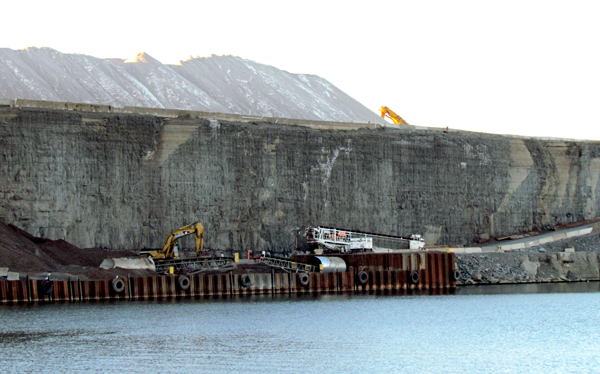New findings of ‘lethal levels’ of contaminants adjourns Picton Terminals court case
Sue Capon | Feb 28, 2018 | Comments 2
 New information on “lethal levels” of contaminants in Picton Bay has adjourned a legal case examining if Picton Terminals can continue operating under the County’s current bylaw.
New information on “lethal levels” of contaminants in Picton Bay has adjourned a legal case examining if Picton Terminals can continue operating under the County’s current bylaw.
Citizen group ‘Save Picton Bay’, and more than two dozen supporters were in the Superior Court in Picton Wednesday morning, along with legal representatives for the municipality and Picton Terminals.
Justice Wolf Tausendfreund stated issues raised in the new information are important, and “go to the very heart of some of the issues” he has reviewed in the court material so far. “If any piece of evidence is missing, the puzzle isn’t solved.” He adjourned the case to April 16, in Belleville (the soonest court time available).
While zoning is the legal topic, Save Picton Bay counsel Eric Gillespie said use of land will be the focus, and the report is important in a community that values its environment and its tourism. A report by consultants retained by Picton Terminals dated Feb. 2, discussed “lethal” effects on fish and fish habitat in Picton Bay and came to light on the weekend.
“Finding out that a local business is irresponsible enough to allow lethal contaminants coming out into the bay in close proximity to the drinking water supply is important information for this court to have when it’s making a decision whether or not to allow that to continue or not.”
Picton Terminals is also under investigation by Environment and Climate Change Canada. In November, responding to a Spills Action Centre complaint regarding uncovered salt piles and seepage into the bay, Environment Canada Enforcement Branch inspectors found evidence of runoff water that “would be acutely lethal and deleterious to fish and aquatic vertebrates.”
The report by Ian Rumbolt, Fishery Inspector, with the Environmental Enforcement Directorate Enforcement Branch ECCC states “immediate action is necessary” as samples collected by ECC on Nov. 5, 2017 from seepage depositing into Picton Bay showed high levels of aluminum (1300 ug/L); Chloride (20,400 mg /L and 21,400 mg/L) and Iron (3660 ug/L) as well as elevated Cyanide (5.69 mg/L)
The report states Canadian Water Quality Guidelines for the protection of aquatic life are 100/ug/L for Aluminum, 640 mg?L short-term or 120 mg/L long-term for Chloride; 300 ug/L for Iron and 5 ug/L for Free Cyanide.
The report calls for Picton Terminals to take all reasonable measures consistent with public safety and protection of fish habitat, to prevent seepage, or to counteract, mitigate or remedy adverse effects. The company must also develop a plan to properly manage the salt piles and associated runoff.
Picton Terminals has also been under fire from the Ministry of Environment and Climate Change with orders related to contamination of water and covering salt piles exposed to significant rain resulting in stormwater runoff containing contaminants – specifically dissolved road salt that discharges to the neighbouring property and directly into Picton Bay.
The Save Picton Bay group has been working since 2015 to have the ministry take further action. The ministry has received more than 72 complaints related to the site.
Picton Terminals, in August of last year, announced plans to construct covered buildings to store salt to solve concerns of dangerous levels of chlorides leeching into the water. The “dry storage” plan is in the process required to receive Ministry of Environment and Climate Change approval.
Filed Under: Featured Articles • Local News
About the Author:































Near the highest if not highest water rates in Canada and you can’t drink the water do to smell and fear of contamination.
Wow. If this mess isn’t soon cleaned-up, we’ll be seeing fish with 2 heads.